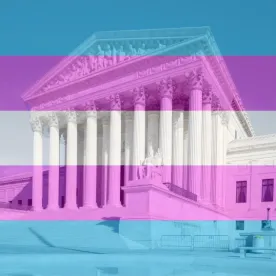Summary
The United States Supreme Court, in a 6-3 ruling, decided on June 15, 2020 that employment discrimination based on homosexuality or transgender status necessarily entails discrimination based on sex, and therefore, it is unlawful under Title VII of the Civil Rights Act of 1964. The decision resolves disagreement among the circuit courts as to the scope of Title VII’s protections for homosexual and transgender persons. As Justice Neil Gorsuch, who delivered the opinion of the Court, opined, “[a]t bottom, these cases involve no more than the straight-forward application of legal terms with plain and settled meanings.”
Full Article
The Opinion
In Bostock v. Clayton County, Georgia, the United States Supreme Court expanded protections against discrimination in the workplace, concluding that discrimination based on one’s homosexuality and transgender status constitutes discrimination on the basis of one’s sex. Accordingly, the Court held that an employer who intentionally treats a person worse because of sex – such as by firing the person for actions or attributes it would tolerate in an individual of another sex – discriminates against that person in violation of Title VII.
In the opinion, Justice Gorsuch strictly construed Title VII’s command that it is “unlawful . . . for an employer to fail or refuse to hire or to discharge any individual, or otherwise to discriminate against any individual with respect to his compensation, terms, conditions, or privileges of employment, because of such individual’s race, color, religion, sex, or national origin.” Justice Gorsuch interpreted the statute in accord with the meaning of its terms at the time of its enactment in 1964. As Justice Gorsuch wrote, “[t]hose who adopted the Civil Rights Act might not have anticipated their work would lead to this particular result . . . [b]ut the limits of the drafters’ imagination supply no reason to ignore the law’s demands.”
The decision was a compilation of three different cases from the Second Circuit, Sixth Circuit, and Eleventh Circuit where employers discharged long-time employees shortly after the employees revealed they were homosexual or transgender. The discharges, as alleged, were for no reason other than each employee’s homosexuality or transgender status.
Ramifications of the Decision
The Court adopted the following momentous rule: an individual’s homosexuality or transgender status is not relevant to employment decisions. Making employment decisions based upon these factors is simply another form of sex discrimination. The Court gave the following, very poignant, hypothetical: an employer has two employees, both of whom are attracted to men. The two employees are identical in all respects, except that one is a man and the other a woman. If the male employee was fired for no reason other than the fact he was attracted to men, the employer would be discriminating against him.
Unanswered Questions
Notably, the Court was quick to avoid discussing other related issues. The Court refused to address the issue of sex-segregated bathrooms, locker rooms, and dress codes, opining that the Court does “not prejudge any such questions today.” Further, the Court dodged the issue of employers’ fear of how complying with the new interpretation of Title VII violates their religious convictions.
Dissents
Justices Alito, Thomas, and Kavanaugh dissented. Justice Alito, joined by Justice Thomas, noted that Congress has refused to add “sexual orientation” or “gender identity” to the list of protected statuses under Title VII. He argued that until 2017, every single Court of Appeals to consider the question interpreted Title VII’s prohibition against sex discrimination to mean discrimination on the basis of biological sex. Justice Kavanaugh opined that the issue is a legislative one, not a judicial one, and as written, Title VII does not prohibit employment discrimination because of sexual orientation. He highlighted that 30 out of 30 federal judges in the first 10 U.S. Courts of Appeals who had considered whether Title VII prohibited sexual orientation discrimination all said it did not.
Conclusion
The Supreme Court’s decision in Bostock provides much needed clarity to employers and employees alike. Going forward, it is now clear that it is unlawful to discriminate against employees based upon their sexual orientation or gender identity.





 />i
/>i
